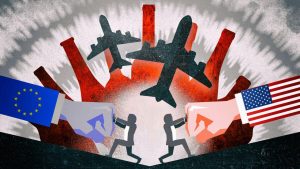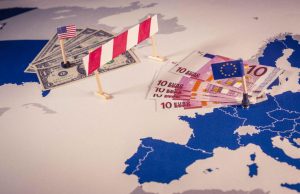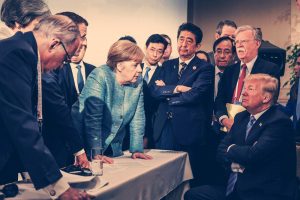New US tariffs on certain EU products entered into force on October 181 —especially from France, United Kingdom, Germany and Spain—, as a result of a demand that the US made before the World Trade Organization in 2004.
Illegal EU subsidies to the aircraft manufacturer Airbus are officially the reason for this demand. These tariffs will record European aircraft with 10% and the other series of products not related to aeronautics with 25%. However, negotiations between the EU and the US on other goods continue. On the one hand, the United States is authorized to apply up to 100% tariffs on airplanes and related products2. On the other, the Commissioner of Commerce of the EU affirms that tariffs will be applied to the American Boeing for also receiving aid from the Federal Government3.
Protectionist economic policies, apparently, collide with neoliberal logic and threaten global economic growth and trade4. Kristalina Georgieva, director of the IMF, threatens serious consequences for the economy of the planet if there is an escalation of protectionist measures among the world’s major economies5.
If this trade war is consummated, the EU will be particularly damaged, as it has one of the most open and exporting economies in the world6. On the other hand, the European economy had barely recovered after the last major crisis of 2007, with bank bailouts and harsh austerity policies7: low public coffers, very high levels of indebtedness, high unemployment rates, precarious contracts and low wages, as well as lower productivity and an aging population, among many other problems. Thus, the governments and the Central Banks of the EU barely have the resources to face a new imminent crisis8. Not forgetting Brexit, which will remove the European economic board to materialize.

However, protectionist measures may seem like a solution for the relocation of industrial manufacturing in recent years in Western countries. But in a globalized and transnational economy such as the current one, any limitation to trade has serious consequences for citizens9. At present, society is basically made up of working and impoverished people who are caught in the “game of globalization” consisting of privatizing profits and socializing losses.
Thus, the struggle of the impoverished must be global, in search for an economic model that does not impose borders between people while it eliminates them for businesses and large fortunes. The redistribution of wealth, popular sovereignty on the part of working citizenship as well as putting the environment, people and peoples before benefits and power structure must be fundamental axes of future societies. There are dozens of formulas and economic theories that bet on a fairer world. Let’s put them into practice.
1https://www.efe.com/efe/espana/efeempresas/entran-en-vigor-los-aranceles-de-eeuu-a-europa-que-anuncia-respondera-con-otros-por-valor-7-500-millones/50000908-4089878
2https://ustr.gov/about-us/policy-offices/press-office/press-releases/2019/october/us-wins-75-billion-award-airbus
3https://europa.eu/rapid/press-release_STATEMENT-19-6132_en.htm
4https://www.wto.org/spanish/news_s/pres19_s/pr840_s.htm
5https://www.youtube.com/watch?list=PLeEzCJHXClX3yLs95Ye0Xq6u9Srtmq3M5&v=KXovYf4rN-c
6http://www.economiacritica.net/?p=12259#more-12259
7https://revistas.ucm.es › index.php › PADE › article › download
8http://www.economiacritica.net/?p=12212#comment-6345
9https://ctxt.es/es/20181031/Politica/22551/Jamie-Merchant-THE-BAFFLER-Estado-de-bienestar-economia-socialdemocracia-nacionalismo.htm
More information:
Become Interest:
SCOTLAND: THE RIGHT OF SELF-DETERMINATION

